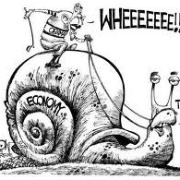The government shutdown, if short, will mildly depress Q4 GDP growth. The same can’t be said for failing to raise the debt ceiling. The government currently runs a $640 billion deficit/year, 4% of GDP, while GDP growth is 2%. If the debt ceiling isn’t raised, the budget must be balanced, thus federal spending would drop by $640 billion/year causing a recession. Worse, there wouldn’t be mitigating fiscal or monetary policy.
Tag Archives: Recession
GDP Behaving Badly
Despite GDP contracting at an annual rate of 0.1% in Q4 2012, the worst quarter since the end of the recession in 6/09, another recession isn’t in the cards. That’s because the data also showed relatively strong spending by consumers and businesses. Military spending posted its sharpest quarterly drop in 40 years, 22.2% (a one-time event) and exports fell due to falling GDP in Europe. Q1 GDP will be 1%.
The 60’s are Back
Median inflation-adjusted income (MIAI) for men in 2011 was $32,986, $14 shy of $33,000. While that’s $3,023 below the pre-recession high of $36,009 set in 2007, the all-time high of $37,017 was set in 2000. Worse, MIAI for men first exceeded $33,000 in 1968, yes 1-9-6-8! For women, the 2011 median was $21,102, $1,593 off the high of $22,695 set in 2007 and back to where it was in 2001.
Could be Worse!
Greece has been in recession since Q3 ‘08. During that time, new car registrations have fallen 82%, back to where they were in the late ‘80s, and GDP has fallen 18%. Here, at their worst, car sales were down 56% and now are now down just 18% from where they were before the recession. At its worst, US GDP was down 5% and is now 2% above the prior peak.
Euro Budget Craziness
The European Stability and Growth Pact, that Germany is insisting on –-which requires governments to keep deficits to no more than 3% of GDP — is nuts. In good times, it promotes increased government spending but forces cuts in recessions. This exacerbates economic cycles and is the opposite of good policy. As long as it survives, Europe will lurch from boom to bust! It must be changed.
Underwater Houses
Banks currently own 450,000 houses, 2 million are in foreclosure, and 1.7 million more have not had a mortgage payment made on them in 90 days. This adds up to 4.15 million houses. The problem is that the economy has lost 5.2 million jobs since the start of the recession in January ’08. Absent those job losses, the foreclosure problem vanishes. That’s why robust job growth is so critical.
Sluggish Economy
The IMF sees global growth in ’12 slowing to 3.25% from 4% in ’11. It’s because the 17 nation Euro-zone will contract by 0.5% and China’s growth will slow from 9% to 8.2%. Growth here is expected to be 2%; better than ’11 but not enough to really dent unemployment. By suggesting, earlier today, that it will keep interest rates where they are till late ’14, the Fed has admitted that it too expects sluggish growth.
Cheer up, things could be worse!
 The Institute of Supply Management’s August manufacturing report was very weak with a reading of 50.4 barely above the 50 level, indicating expansion. And, its steadily decline from a high of 61.4 in Feb is troubling. But, don’t fret. Other manufacturing surveys were better, and, historically, the index must drop to about 42 or 43 before a recession is imminent. So, relax, things can get worse, before the really get worse.
The Institute of Supply Management’s August manufacturing report was very weak with a reading of 50.4 barely above the 50 level, indicating expansion. And, its steadily decline from a high of 61.4 in Feb is troubling. But, don’t fret. Other manufacturing surveys were better, and, historically, the index must drop to about 42 or 43 before a recession is imminent. So, relax, things can get worse, before the really get worse.
Weak. Very Weak.
 Weak in review: 10-yr Treasury rates fell to their lowest level since 4/50 and the stock market plummeted! This was due to the unfolding Euro disaster, a benign fear of long-term US inflation and a dismal Philly Fed number, a measure of mid-Atlantic factory activity, that fell to a 2.5 year low, suggesting anemic US growth. Credit Suisse said if the Philly # is a national barometer (who knows if it is), a recession already began.
Weak in review: 10-yr Treasury rates fell to their lowest level since 4/50 and the stock market plummeted! This was due to the unfolding Euro disaster, a benign fear of long-term US inflation and a dismal Philly Fed number, a measure of mid-Atlantic factory activity, that fell to a 2.5 year low, suggesting anemic US growth. Credit Suisse said if the Philly # is a national barometer (who knows if it is), a recession already began.
Trade Deficit Dynamics
The March trade deficit fell by 2.6% but, hold the applause. Imports fell 1.7% due to a fall in demand for crude oil. Exports fell 1.4% as US auto, industrial machinery & food products fell. As if the decline in exports was not bad enough, for the first few months of ’11 the deficit is running at an annual rate of $556 billion, up from $496 last year and up a huge 33% from ’09 when the recession cut deeply in US demand for foreign goods.





